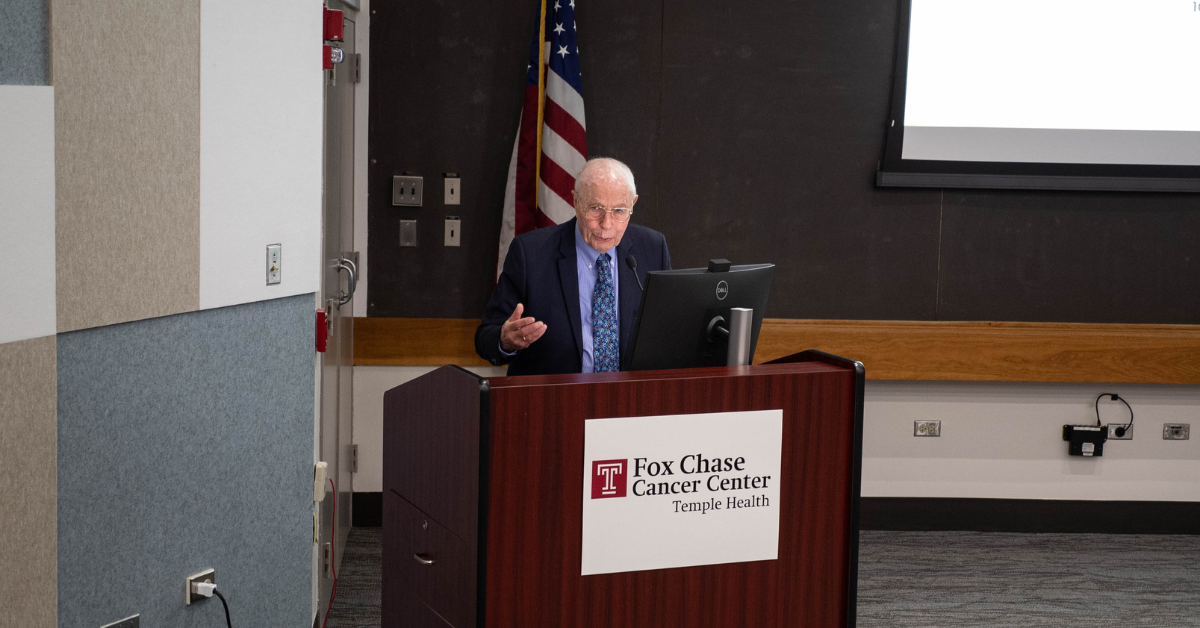New Inpatient Visitor Check-In Process Effective March 10. Learn more here.
Breadcrumb
- Home
- Fox Chase Cancer Center News
- Fox Chase Cancer Center’s 14th Annual Scientific Symposium Celebrates 20-Year Anniversary of Nobel Prize-Winning Discovery
Fox Chase Cancer Center’s 14th Annual Scientific Symposium Celebrates 20-Year Anniversary of Nobel Prize-Winning Discovery

Fox Chase Cancer Center welcomed researchers to the Center’s Leidy Auditorium in October for the 14th Annual Scientific Symposium, which was hosted by Fox Chase’s Center for Immunology.
The symposium highlighted the 20th anniversary of the Nobel Prize in Chemistry awarded to Irwin A. “Ernie” Rose, PhD, Avram Hershko, MD, PhD, and Aaron Ciechanover, MD, DSc, for their discovery of ubiquitin-mediated protein degradation. This work, much of which was carried out at Fox Chase, has been instrumental in illuminating understanding of how proteins are recycled after they are used, with fundamental implications for cellular processes like transcription, division, and death.
In his introduction to the symposium, Siddharth Balachandran, PhD, Co-Director of the Center for Immunology, shared the contents of a memo written on October 18, 1979, by Alfred “Al” Knudson, MD, PhD, Cancer Center Director at the time, to Francis J. “Jay” McKay, the Executive Vice President of Fox Chase. The memo highlighted Knudson’s foresight in identifying the work on ubiquitin-mediated protein degradation by the trio as groundbreaking.
“It seems that the entire problem of how the breakdown of cellular protein is regulated has become accessible. This will surely have great implications for developmental processes from normal physiology and for cell death and cancer. The implications are enormous,” Knudson wrote in 1979.
Forty-five years later, Fox Chase welcomed Hershko as a Keynote Speaker for the symposium, along with Eric Fischer, PhD, of Harvard Medical School. Rose died in 2015.
“I am impressed by how visionary Al Knudson was. I didn’t think what we found would be important in development, in cancer, in inflammation, but he was right. It’s really remarkable. I am very glad to be here today and to share with you my memories of the role of Fox Chase Cancer Center in this discovery,” said Hershko.
Ubiquitin is a regulatory protein that received its name because it is ubiquitous — found everywhere in the cells of animals and plants. In normal cell function, it serves as the cell’s recycling system by targeting unwanted proteins for breakdown and recycling once their specific task within the cell is done. Besides recycling products the cell no longer needs, ubiquitin helps regulate multiple other cellular processes.
In decoding this process, Rose, Hershko, and Ciechanover helped future researchers understand how cancers develop when the degradation cycle is disrupted.
The implications of the discovery weren’t fully realized until 2003, when a drug came to market that harnessed the power of ubiquitin. Bortezomib, known commercially as Velcade, interferes with the process of protein degradation and helps attack multiple myeloma, a cancer of the bone marrow. It was the first medication based on the award-winning team’s research to be approved by the Food and Drug Administration.
Since then, the discovery has opened several new therapeutic entry points, many of which are currently in clinical trials, for cancer and other diseases.
The symposium welcomed scientists from Fox Chase, Harvard University, Memorial Sloan Kettering Cancer Center, Johns Hopkins University School of Medicine, Washington University School of Medicine, and the National Institutes of Health to present their current work on these new developments.
“This symposium has become a flagship event in our calendar and a favorite day for all of us here,” said Balachandran. “We are proud to welcome Dr. Hershko and all our scientists who are presenting today.”
Fox Chase Cancer Center (Fox Chase), which includes the Institute for Cancer Research and the American Oncologic Hospital and is a part of Temple Health, is one of the leading comprehensive cancer centers in the United States. Founded in 1904 in Philadelphia as one of the nation’s first cancer hospitals, Fox Chase was also among the first institutions to be designated a National Cancer Institute Comprehensive Cancer Center in 1974. Fox Chase is also one of just 10 members of the Alliance of Dedicated Cancer Centers. Fox Chase researchers have won the highest awards in their fields, including two Nobel Prizes. Fox Chase physicians are also routinely recognized in national rankings, and the Center’s nursing program has received the Magnet recognition for excellence six consecutive times. Today, Fox Chase conducts a broad array of nationally competitive basic, translational, and clinical research, with special programs in cancer prevention, detection, survivorship, and community outreach. It is the policy of Fox Chase Cancer Center that there shall be no exclusion from, or participation in, and no one denied the benefits of, the delivery of quality medical care on the basis of race, ethnicity, religion, sexual orientation, gender, gender identity/expression, disability, age, ancestry, color, national origin, physical ability, level of education, or source of payment.
For more information, call 888-369-2427
Share
-
Share with Facebook
-
Share with twitter
-
Share with email
-
Print this